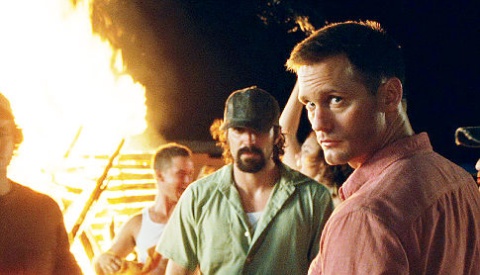Culture
Treating humanity as “Dogs”

Straw Dogs
dir. Rod Lurie
Release Date: Sep 16, 11
- 1
- 2
- 3
- 4
- 5
- 6
- 7
- 8
- 9
- 10
The original Straw Dogs worked precisely because Sam Peckinpah as a filmmaker understood the value of violence. There is to be nothing fetishistic about it in his filmic universe; it is a savage thing, and there is not glamour in it but instead just the void of death. In comparison, Rod Lurie’s remake is an unpleasant, lurid exercise in the ever-popular media of the torture porn and home invasion subgenres. It’s a depressing affair, in no small part because it lacks the gritty, realistic punch that it needs to stay afloat.
James Marsden takes over the Dustin Hoffman role as David Sumner, a screenwriter who relocates with his wife Amy (Kate Bosworth) to her hometown in Mississippi. There, he finds himself a fish out of water, a classical music afficionado/writer of Russian epics/general West Coast dandy amongst working class man’s men who drink to excess, treat football and God as the true idols and drive pickup trucks. Soon, Amy’s former lover Charlie (Alexander Skarsgard) and his construction crew begin work on some of David’s home renovations, only to reveal a more sinister nature and some bad intentions for the mostly happy couple.
The first major issue with Straw Dogs are the two lead performances. I exclude Skarsgard, who’s effectively charming and terrifying as needed. Instead, there’s Marsden, usually underrated as a performer, who’s so assiduously cowardly that a) there’s no real desire to see him take his inevitable revenge and b) that transformation into a tough guy that’s been sold to death in every advertisement for the film rings utterly, truly false. It’s not that it’s implausible; the whole point of the film is that anybody, when provoked, can be driven to violence. It’s that he turns into a comical facsimile of a badass, a Rambo pulling antiquated hunting equipment off the walls to wreak havoc. Bosworth, for her part, mostly snipes and weeps; she’s flat as usual, though the film takes no small pains to put her through Von Trier-esque trials of humiliation and suffering at all possible turns.
Speaking of that, the scene where Straw Dogs really goes to hell is reminiscent of the most controversial scene in the original. Without saying too much, the controversy in Peckinpah’s original came from the implication that a damaged woman could take some kind of pleasure in being attacked, for the connection to absolute animalistic manhood it implies. Rightly, Lurie makes sure that Amy is horrified, but at the same time traffics in the violence he’s attempting to condemn, shooting with a lurid series of jumpy edits straight out of Hostel and a cinematographic eye that puts you right in the thick of things. To complete his hat trick of offending the audience’s senses, this is juxtaposed with Marsden hunting and conquering an animal, possibly the most offensive use of montage editing in a film since Precious.
There are also technical troubles, such as characters that appear and disappear for long chunks, only utilized when convenient. Tonally, the film veers between several different approaches to its source material, and settles on the worst of them after taking day trips through a relationship drama and the Southern culture film. There’s an entire subplot involving a mentally handicapped local that’s so tonally off it almost feels copy-and-pasted from another film (mainly Of Mice And Men), at least until it becomes the convoluted catalyst for David’s transformation into a real man. Straw Dogs is not just an unpleasant affair to watch, it’s also just a poorly made action movie, poorer still for the fact that it isn’t supposed to be one.
Pingback: » Blog Archive » ‘Straw Dogs’ remake just a vehicle for violence – HeraldNet()